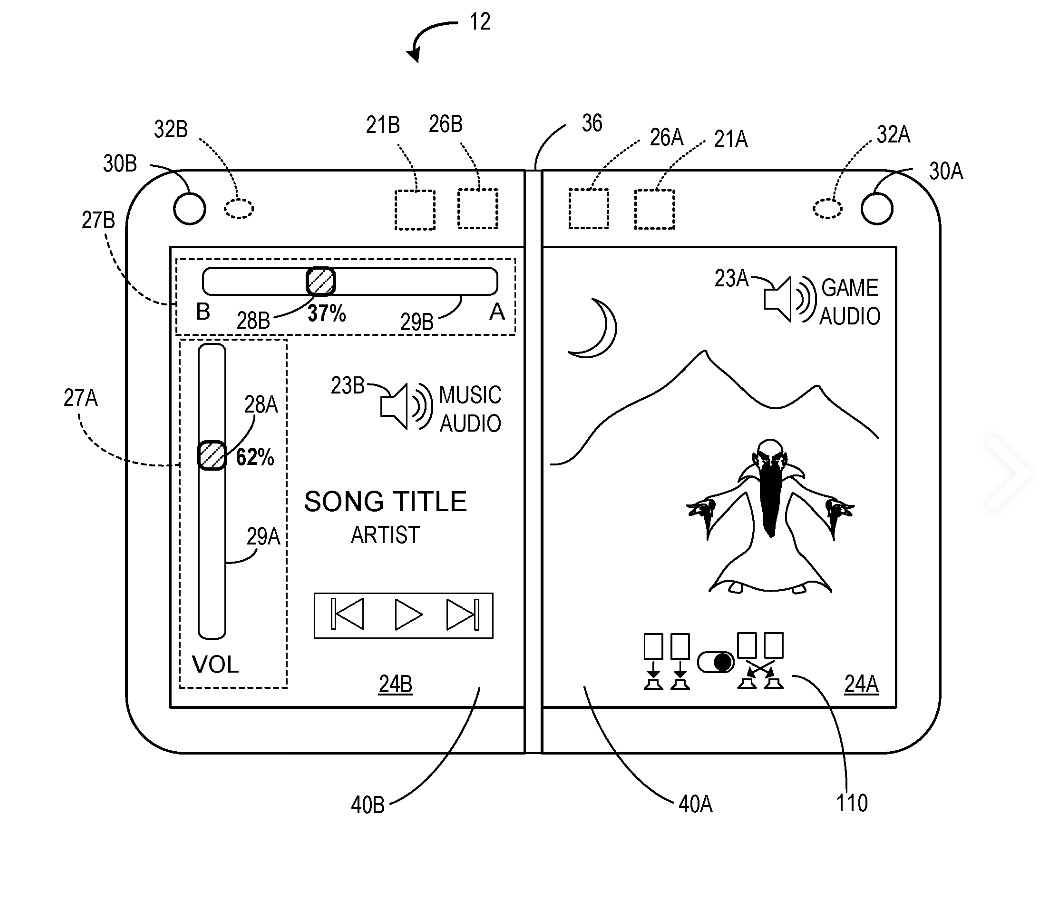Surface 'Andromeda' might use face detection for intuitive volume controls

Microsoft is showing no sign of quitting its Surface Andromeda patent-a-thon, from big technological solutions to pouring over all sorts of finer details. The very thought of a dual-screen computer creates a range of usability issues that we take for granted with today'due south single-slate tablets and phones, and clearly Microsoft is ensuring that information technology is really thinking through all the finer points of how a dual-screen tablet could work.
This latest patent describes issues that come with dual-purpose volume mixing, where you can have separate apps and features present across two displays.
When viewing content on the screens in these varying positions, users may run into challenges adjusting the audio volumes of different applications executed on each of the screens, or different audio-enabled graphical user elements displayed on each of the screens.

If this patent bears fruit, it seems every bit though Microsoft is looking to enlist dual cameras on Andromeda to detect distance and gaze for the tablet'due south users. Some of the scenarios described include automatically increasing the book when you lot're further away from the device while playing a game, and also swapping the residual from one display to the other based on which one you're looking at.
Additionally, the patent covers other events for configuring audio, including hinge positions, and it can too trigger a mute if no face up is detected. The patent also notes that regular on-screen GUI volume controls will also be present. The patent besides covers scenarios for sending sound to left and right headphones connected either wirelessly or via a headphone jack, allowing users to play sound from each individual app in divide ears, or mixed in stereo.

On a related note, Microsoft too patented methods for Andromeda to take haptic-based power and volume buttons, doing away with the machine buttons near phones and tablets still have in 2022. The patent talks virtually implementing haptic feedback on the sides and dorsum of the device, allowing users to "feel" virtual book and ability buttons with haptic feedback either via vibrations, pulses, or textures that remain affluent with the device.
We nevertheless accept no real idea whether Andromeda will ever hit store shelves, merely it'southward nice to dream. At the very least, the Surface labs are churning away on exploring all sorts of features that could brand their mode into all sorts of Surface devices, fifty-fifty if Andromeda never sees the light of 24-hour interval. Hither's hoping, either way.

New ways to test
Minecraft Preview tin can at present be downloaded and played on Windows
On Mon, Mojang Studios appear Minecraft Preview, a new Minecraft game that will let players test upcoming changes and updates before they release. Minecraft Preview will eventually replace the current Minecraft: Bedrock Edition beta program.

Buyer's guide
Protect your Surface Pro with i of these groovy cases
You have a Surface Pro in your hands and you want to protect it. This roundup of cases compatible with Pro 4, Pro (2017), Pro 6, Pro vii, and Pro vii Plus covers rugged and stylish options so that you observe something you like.
Source: https://www.windowscentral.com/surface-andromeda-might-use-face-detection-improve-volume-controls
Posted by: wagnerolunnime1968.blogspot.com


0 Response to "Surface 'Andromeda' might use face detection for intuitive volume controls"
Post a Comment